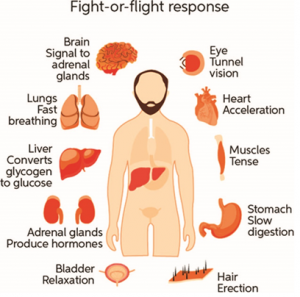What is Stress?
Stress isn’t always obvious and can be subtle. Emotional stress might look like, worrying about your family or work, or physical stress can be experiencing sickness or injury.
What can stress look like?
Physically:
• headaches or dizziness
• muscle tension or pain
• stomach problems
• chest pain or a faster heartbeat
• sexual problems
Mentally:
• difficulty concentrating
• struggling to make decisions
• feeling overwhelmed
• constantly worrying
• being forgetful
Behaviourally:
• being irritable and snappy
• sleeping too much or too little
• eating too much or too little
• avoiding certain places or people
• drinking or smoking more
How does the body respond to stress?
When you are stressed, the body prepares itself by making sure there is enough sugar or energy available to spring into action. You may have heard of the flight or fight response; this is an automatic physiological and psychological response to an event that is perceived as stressful or frightening and body doesn’t distinguish from helpful stress like preparing to get married and unhelpful stress such as dealing with the loss of a loved one.
Physiologically stress looks like this:

What happens to your blood sugar levels when you are stressed?
When you experience a stressful event, and your body goes into the flight or fight response, your body releases stress hormones. Adrenaline increases (stress hormone) and glucose (stored energy) is released from the liver to prepare your body for action, to run away or fight the situation. Cortisol (stress hormone) also increases, which causes your muscles and fat to be less sensitive to insulin, which means your insulin levels fall.
Because of diabetes, the insulin in your body is not able to do it’s job properly, this means there is more glucose available in your blood stream. So, when you are stressed, your blood sugars levels can go up and be more difficult to control. Additionally, when under stress you might find that you’ll eat more or less, exercise less or have trouble keeping track of medication making it harder for you to manage your diabetes.
What can you do to help manage stress?
If you are thinking that this is just another thing to worry about, don’t be disheartened. Stress can be managed, having a positive effect on not only your blood glucose levels but your diabetes management overall.
4 ways to manage stress
Use Social Support
Use your social supports or create new social supports. Research has shown social supports are effective in the reduction of stress in people with chronic diseases and are related to maintaining self-care behaviours in people with Type-2 Diabetes. So, don’t put off catching up with mates or loved ones, sit down and have that cup of tea or coffee with your friend because it’s going to help you in the long run.
Physical movement and exercise
It may be the last thing you want to do when you’re feeling stressed and overwhelmed but we know that exercise is good for improving mental health If you’re struggling to exercise, any movement is better than none at all.
You can break your exercise down in to bite size chunks until you’re ready to do more. Even if you’re just doing 10 minutes of planned walking in the morning or completing incidental exercise such as walking the dog, going out for coffee or taking the kids to school, it’s a start. You can always ask one of the friendly exercise physiologists to help you with this!
Be kind to yourself
Start being kind to yourself. Acknowledge you have a lot going on but that you’re also doing the best that you can. Celebrate the small wins, did you manage to get something checked off your list today? Well done! Or instead, if you just ate another serving of delicious dessert to cope with what’s going on, that’s fine too, don’t beat yourself up about it.
It might sound like a small thing to do but it can make a world of difference in just taking the pressure off yourself and acknowledging you are capable and have more control over things . These things will help to increase your self-confidence when you are stressed.
Self-confidence is essentially our confidence we have in ourselves, to be able to control our motivation, behaviour and social environment. This may look like your confidence in your ability to get your diabetes management back on track and following advice from health professionals to do so. Believing you are more in control will help reduce your stress and research has shown greater self-confidence is related to better management and adaptation to having diabetes.
Practice mindfulness
When we are stressed, we can be living in the past or worried about the future. It can be a bit too much for our minds to cope with and can even affect our sleep. Mindfulness is about being in the present moment, being curious open, and non-judgmental. Mindfulness has been shown to reduce worries, anxiety, distress, help regulate our emotion, create and sense of calm, and help us to relax.
Smiling mind is a nifty free tool you can download on your phone that has a lot of mindfulness exercises. You can learn more here.
If you’re still feeling like it’s all too much you can come and speak to our Psychology team to help reduce your stress and get your diabetes management back on track.
References
Carey, M. P., & Forsyth, A. D. (2009). Self-efficacy teaching tip sheet. https://www.apa.org. https://www.apa.org/pi/aids/resources/education/self-efficacy
Devonport, T. J. (2011). Managing stress : from theory to application (Ser. Psychology research progress). Nova Science. http://site.ebrary.com/id/10676643.
Diabetes Australia. (2022, May 31a). How can diabetes affect my feelings?https://www.diabetesaustralia.com.au/blog/how-can-diabetes-affect-my-feelings/
Diabetes Australia. (2022, May 31b). No more excuses step into spring and build walking into your daily routine. https://www.diabetesaustralia.com.au/blog/no-more-excuses-step-into-spring-and-build-walking-into-your-daily-routine/
Diabetes Australia. (2022, June 1). What is mindfulness?https://www.diabetesaustralia.com.au/blog/what-is-mindfulness/
Diabetes Australia. (2022, June 7). Why do we exercise?https://www.diabetesaustralia.com.au/blog/why-do-we-exercise/
Kennedy, M. K. (2002). Blood sugar & stress :: Diabetes education online. Diabetes Education Online :: Diabetes Teaching Center at the University of California, San Francisco. https://dtc.ucsf.edu/types-of-diabetes/type2/understanding-type-2-diabetes/how-the-body-processes-sugar/blood-sugar-stress/
Smiling Mind. (2022). What is mindfulness? — Smiling mind. https://www.smilingmind.com.au/mindfulness
Zamani-Alavijeh, F., Araban, M., Koohestani, H.R. et al. (2018). The effectiveness of stress management training on blood glucose control in patients with type 2 diabetes. Diabetol Metab Syndr 10, 39.https://doi.org/10.1186/s13098-018-0342-5
https://images.ctfassets.net/vrrt8fsfwf0e/JO8IIGKhVvhSDqZRkTWga/28246d38a4ee50d35ddfa40ef17911f5/Physiological_responses_to_stress_Art_2.svg










